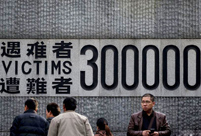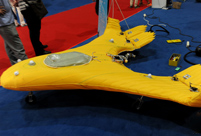 Chinese lingerie brand arrives in Las Vegas
Chinese lingerie brand arrives in Las Vegas
 In pics: YOG prism
In pics: YOG prism
 Amputee girl reaches top of half-left tower in Jiangxi
Amputee girl reaches top of half-left tower in Jiangxi
 Yardangs in Lop Nur
Yardangs in Lop Nur
 Intoxicating Ayding Lake in Xinjiang
Intoxicating Ayding Lake in Xinjiang
 Beijing's MJ impersonator a 'thriller' for crowds
Beijing's MJ impersonator a 'thriller' for crowds
 Armed police compete on the plateau
Armed police compete on the plateau
 Rubber Duck settles in Guiyang new urban area
Rubber Duck settles in Guiyang new urban area
 Rare set of giant panda triplets turn one month old
Rare set of giant panda triplets turn one month old
 Attractive posters to welcome freshmen
Attractive posters to welcome freshmen
BEIJING, Sept. 3 -- Sixty-nine years ago, Japan signed surrender documents aboard the deck of the American battleship USS Missouri, marking an end to the world's anti-fascism war as well as China's anti-Japanese war.
The triumph of justice over evil opened a new epoch in which the mankind took a huge step toward peace and order. However, it was a hard-won victory. On the land of China alone, millions of people were killed during the Japanese aggression from 1931 to 1945.
This year, Beijing designated Sept. 3 as the victory day of China's anti-Japanese war. The grandness of the commemoration does not only mean to celebrate, but to alarm the world that the militaristic and rightist sentiments once led Japan astray down the path of aggression are once again spreading in the island nation.
In sheer defiance of post-war international order and law, Japan in recently years announced "nationalization" of the Diaoyu Islands, which are integral part of the Chinese territory. It also picked fights with other neighbors and former war victims over land disputes.
The Japanese right wing has also been twisting facts in history textbooks and paying repeated visits the notorious Yasukuni Shrine, which honors top war criminals, in a bid to gloss over the nature of war.
More dangerously, the Japanese government, with Prime Minister Shinzo Abe at the helm, drastically changed its defense stance by reinterpreting a war-renouncing constitution to allow the Self-Defense Forces to exercise right to collective self-defense, sowing the seeds of instability in the Asia-Pacific region.
It should sound alarm to the world that rightist sentiments had thrived in Japan right before the WWII. Now, instead of indulging Japan for some short-time interests, world powers should join hands to pull back Tokyo from a militaristic path, for a war would bring devastating results to every country in the world.
The resurrection of militarism should also alarm Japan itself. The barrage of words and deeds by rightist politicians has been isolating Japan from a world that is in pursuit of peace of prosperity.
The world is different from decades ago, as it becomes ever more globalized, the well-being of one country is ever more connected with the well-being with others. No country could thrive alone in a turbulent region.
Not to mention that Japan, which grew into the world's second largest economy after WWII, is itself a beneficiary of post-war peace and order.
It is foolish to make the same mistake twice. It is advisable for the current Japanese leaders to truly reflect upon the lessons of history so as to avert a risky future.
 "Twin flowers" bloom in the air
"Twin flowers" bloom in the air China names 80 Anti-Japanese War memorial sites
China names 80 Anti-Japanese War memorial sites The 4th China-Eurasia Expo opens in Urumqi
The 4th China-Eurasia Expo opens in Urumqi Tall girls shine at model competition
Tall girls shine at model competition Girl who cannot gain weight: She is 1, 2.9 kilograms
Girl who cannot gain weight: She is 1, 2.9 kilograms Bazinga! Watch out the 'facekini' fashion bomb attack
Bazinga! Watch out the 'facekini' fashion bomb attack Experiencing maiden voyage between Sanya and Xisha
Experiencing maiden voyage between Sanya and Xisha Chinese inflatable aircraft meets public for the first time
Chinese inflatable aircraft meets public for the first time People enjoy delicacies in Tianjin undersea tunnel
People enjoy delicacies in Tianjin undersea tunnel Capital Spirits: the capital's first liquor bar
Capital Spirits: the capital's first liquor bar 2014 int’l drone exhibition
2014 int’l drone exhibition Chengdu International Auto Show
Chengdu International Auto Show Trainings taken by Chinese navy divers
Trainings taken by Chinese navy divers Anti-terrorism electric patrol car
Anti-terrorism electric patrol car Female PLA honor guards
Female PLA honor guardsDay|Week|Month